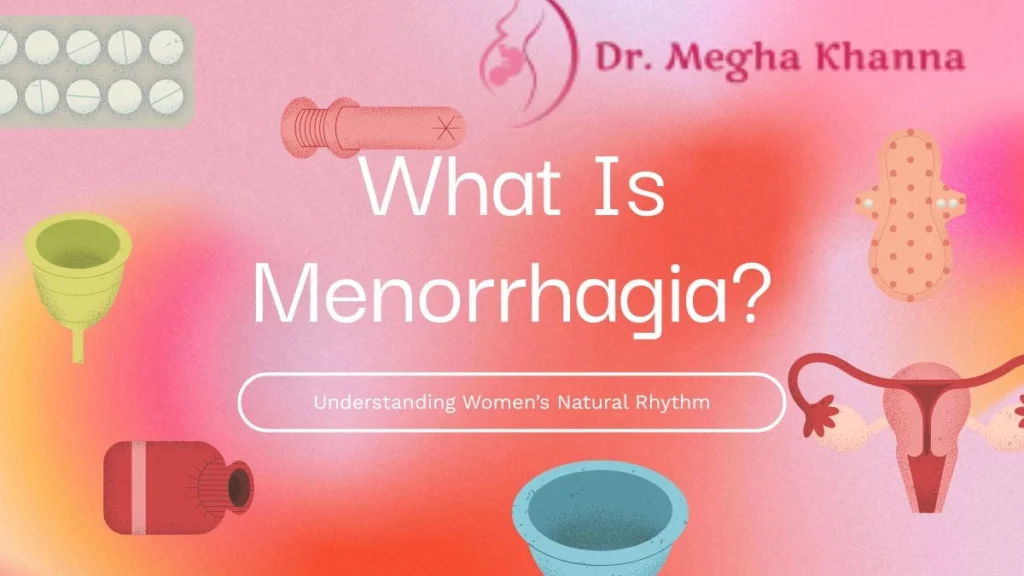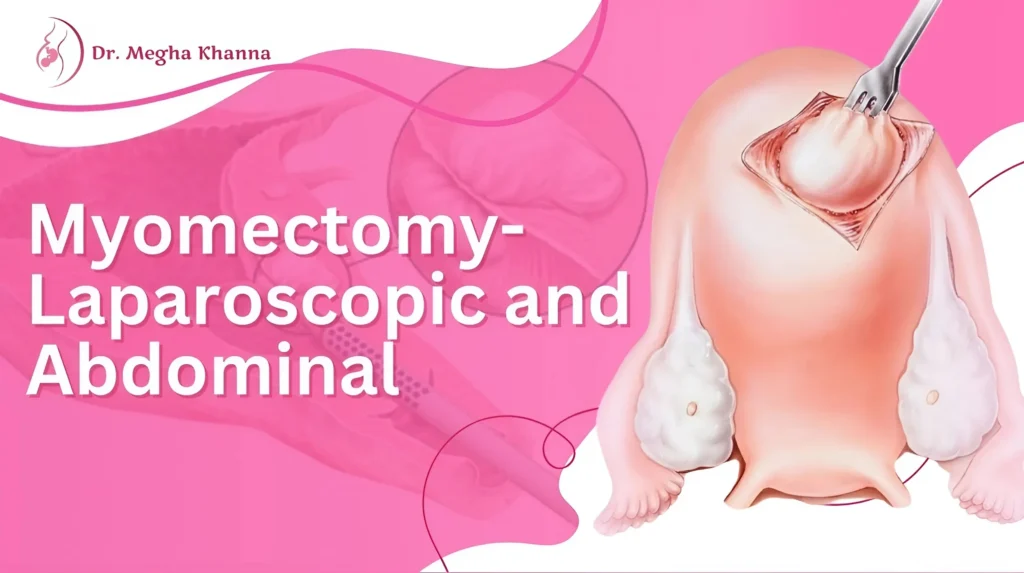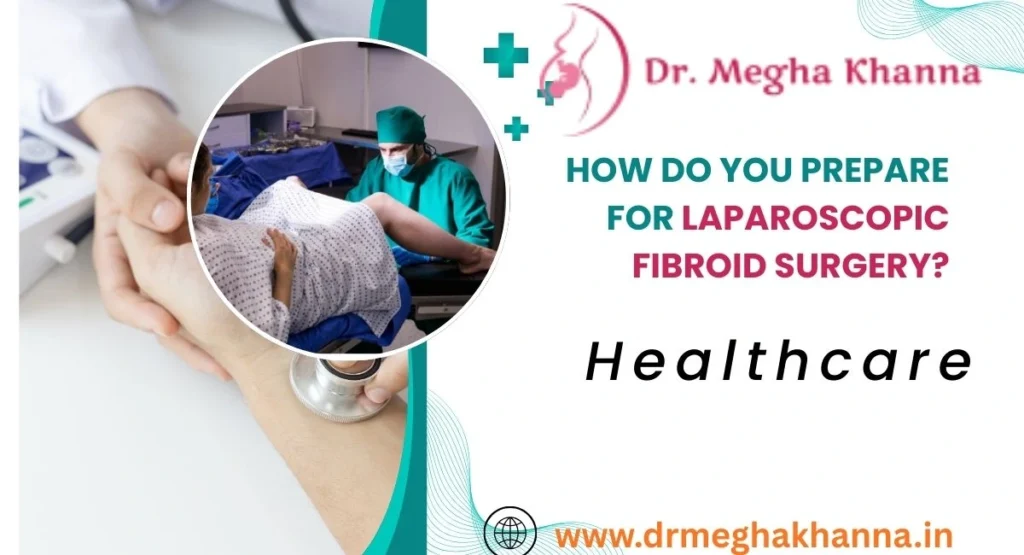-
Ganesh Talkies, Kolkata
Ganesh Talkies, Kolkata

MeghaKhanna
23.12.2025
Causes, Symptoms & Treatment Explained by the Best Lady Gynecologist in Kolkata, Dr Megha Khanna.. Understanding Menorrhagia with the Best Lady Gynecologist in Kolkata The best lady gynecologist in Kolkata, Dr. Megha Khanna, explains that menorrhagia refers to abnormally heavy or prolonged menstrual bleeding that can disrupt daily life and affect overall health. Women experiencing severe menstrual bleeding often require expert evaluation to determine whether medical management, laparoscopic myomectomy, or vaginal hysterectomy is the most appropriate treatment. Early consultation with the best lady gyno doctor in Kolkata ensures accurate diagnosis and personalized care. Understanding Menorrhagia with the Best Lady Gynecologist in KolkataWhat Is Menorrhagia?Medical Definition Explained SimplyCommon Signs of MenorrhagiaWhat Causes Menorrhagia?Expert Insights from the Best Lady Gynecologist in KolkataCommon Causes of Heavy Menstrual BleedingWhat Causes Menorrhagia?Expert Insights from the Best Lady Gynecologist in KolkataCommon Causes of Heavy Menstrual BleedingHow Fibroids Lead to MenorrhagiaRole of Laparoscopic MyomectomyWhen Is Vaginal Hysterectomy Considered?Guidance from the Best Lady Gynecologist in KolkataVaginal Hysterectomy May Be Recommended When:Symptoms That Should Not Be IgnoredWarning Signs Requiring Medical AttentionHow Menorrhagia Is DiagnosedStep-by-Step EvaluationTreatment Options for MenorrhagiaPersonalized Care by Dr. Megha KhannaTreatment Options Include:Benefits of Minimally Invasive ProceduresAdvanced Care by the Best Lady Gynecologist in KolkataWhy Choose Dr. Megha Khanna?Trusted Best Lady Gynecologist in KolkataFinal Thoughts: Don’t Ignore Heavy PeriodsAbout Dr. Megha KhannaFAQs What is the main cause of menorrhagia? Is menorrhagia a serious condition? Who is the best lady gynecologist in Kolkata for menorrhagia?Can laparoscopic myomectomy cure heavy bleeding? When is vaginal hysterectomy necessary? What Is Menorrhagia? Medical Definition Explained Simply Menorrhagia is a condition where menstrual bleeding is excessively heavy, lasts longer than 7 days, or both. Common Signs of Menorrhagia Bleeding longer than 7 days Passing large blood clots Needing to change pads or tampons frequently Fatigue or weakness due to blood loss What Causes Menorrhagia? Expert Insights from the Best Lady Gynecologist in Kolkata Menorrhagia can result from various gynecological or hormonal conditions. Common Causes of Heavy Menstrual Bleeding CauseExplanationUterine FibroidsNon-cancerous growths causing heavy bleedingHormonal ImbalanceEstrogen–progesterone imbalanceAdenomyosisEndometrial tissue grows into uterine muscleEndometrial PolypsBenign growths in uterine liningBleeding DisordersReduced blood clotting abilityCertain MedicationsBlood thinners or hormonal drugs What Causes Menorrhagia? Expert Insights from the Best Lady Gynecologist in Kolkata Menorrhagia can result from various gynecological or hormonal conditions. Common Causes of Heavy Menstrual Bleeding CauseExplanationUterine FibroidsNon-cancerous growths causing heavy bleedingHormonal ImbalanceEstrogen–progesterone imbalanceAdenomyosisEndometrial tissue grows into uterine muscleEndometrial PolypsBenign growths in uterine liningBleeding DisordersReduced blood clotting abilityCertain MedicationsBlood thinners or...

MeghaKhanna
16.12.2025
Can I Walk After Laparoscopic Myomectomy? Walking after surgery is one of the most common concerns among women undergoing fibroid treatment. According to Dr. Megha Khanna, a highly trusted best lady gynecologist in Kolkata and specialist in laparoscopic myomectomy in Kolkata, yes—walking is not only safe but encouraged after laparoscopic myomectomy, provided it is done gradually and under medical guidance.Modern myomectomy surgery in Kolkata focuses on minimally invasive techniques that allow faster recovery, reduced pain, and early mobilization. Laparoscopic Myomectomy is a minimally invasive surgical procedure used to remove uterine fibroids while preserving the uterus. Performed by Dr. Megha Khanna, a renowned gynecologist, this advanced technique involves small keyhole incisions, resulting in less pain, minimal blood loss, and faster recovery compared to open surgery. It is an ideal option for women who wish to maintain fertility or avoid hysterectomy. With expert precision and personalized care, Dr. Megha Khanna ensures safe fibroid removal, quicker return to daily activities, and excellent surgical outcomes. Can I Walk After Laparoscopic Myomectomy?What Is Laparoscopic Myomectomy?Explained by the Best Lady Gynecologist in KolkataKey Features of Myomectomy Surgery in KolkataCan You Walk After Laparoscopic Myomectomy? Expert Answer from Dr. Megha KhannaBenefits of Walking After Myomectomy SurgeryMedical Advantages Explained SimplyWalking Timeline After Laparoscopic MyomectomyWhat to Avoid While Walking Post-SurgerySafety Tips from the Best Lady Gynecologist in KolkataPain Management While WalkingHow Dr. Megha Khanna Ensures ComfortWhen to Call Your Gynecologist?Warning Signs Not to IgnoreWalking vs Bed Rest After MyomectomyFinal Thoughts: Walk Your Way to Faster RecoveryFAQs Can I walk the same day after laparoscopic myomectomy?Is walking painful after myomectomy surgery? How long before I can walk normally? Does walking affect stitches?Who is the best lady gynecologist in Kolkata for myomectomy? What Is Laparoscopic Myomectomy? Explained by the Best Lady Gynecologist in Kolkata Laparoscopic myomectomy is a minimally invasive surgery performed to remove uterine fibroids while preserving the uterus. It is commonly recommended for women who wish to retain fertility. Key Features of Myomectomy Surgery in Kolkata Small keyhole incisions Less blood loss Faster recovery Minimal scarring Dr. Megha Khanna uses advanced techniques to ensure safe and effective laparoscopic myomectomy in Kolkata. Can You Walk After Laparoscopic Myomectomy? Expert Answer from Dr. Megha Khanna ✔ Yes, you can walk within 6–12 hours after surgery ✔ Short walks improve blood circulation✔ Reduces risk of blood clots✔ Helps bowel movement recovery 🚫 Avoid long walks or strenuous movement during the first few days. Benefits of Walking...

MeghaKhanna
11.12.2025
Preparing for laparoscopic fibroid surgery is one of the most important steps to ensure a smooth procedure and quick recovery. Women often feel anxious before the operation, especially when they need expert guidance on diet, tests, medication, and hospital preparation. If you are consulting the best lady gynecologist in Kolkata or looking for a highly experienced Laparoscopic Vaginal Hysterectomy surgeon in Kolkata, understanding the exact preparation process will help you feel confident and informed. How do you take care of laparoscopic fibroid surgery?1: Understanding Laparoscopic Fibroid Surgery What Is Laparoscopic Fibroid Surgery?Who Performs This Surgery?Why Proper Preparation Matters?Benefits of Proper Pre-Surgery Preparation:3: Medical Evaluation Before SurgeryEssential Pre-Operative TestsBlood Tests:Imaging Tests:Other Evaluations: Medical Conditions to Stabilize Before SurgeryPre-Anesthesia Check (PAC)4: Diet & Lifestyle PreparationWhat to Eat 3–7 Days Before SurgeryDiet 24–48 Hours Before Surgery (Important)Fasting Rules (Day of Surgery) Lifestyle Preparation 5: Medication AdjustmentDiscuss All Medications with Your DoctorStop Before Surgery (If doctor advises):Continue Before Surgery (As advised):What About Birth Control Pills?6: Day-Before & Day-Of-Surgery PreparationThe Day Before SurgeryThe Morning of Surgery7: Hospital Preparation ChecklistWhat to Carry to the Hospital8: Emotional & Mental PreparationMental Readiness Tips9: What to Expect After Laparoscopic Fibroid SurgeryImmediate Post-Op ExpectationsRecovery TimelinePre-Surgery Do’s and Don’ts10: Why Choose Dr. Megha KhannaBest Lady Gynecologist in Kolkata – Here’s WhyTop Laparoscopic Vaginal Hysterectomy Surgeon in KolkataFAQsQ1: How do I prepare for laparoscopic fibroid surgery?Q2: Who is the best lady gynecologist in Kolkata for fibroid surgery?Q3: Can I eat the night before laparoscopic fibroid surgery?Q4: What should I avoid before laparoscopic surgery?Q5: Who is the best Laparoscopic Vaginal Hysterectomy surgeon in Kolkata? Under the care of Dr. Megha Khanna, known for her exceptional expertise in minimally invasive gynecologic surgeries, thousands of women have successfully undergone laparoscopic fibroid removal with safe results and rapid recovery. In this comprehensive guide, we explain every step of preparing for laparoscopic fibroid surgery—covering pre-operative tests, dietary instructions, medication rules, mental readiness, hospital planning, and postoperative expectations. Many women have faced a fibroid tumour and it needs surgery on an emergency basis so they need to do laparoscopic vaginal hysterectomy surgery which is fruitful for successful tumour removal. How do you take care of laparoscopic fibroid surgery? To prepare for laparoscopic fibroid surgery, complete all pre-operative tests, review medications with your gynecologist, follow a light and low-fiber diet for 24–48 hours, avoid solid food 8 hours before surgery, stay hydrated, arrange hospital essentials, stop smoking, control hypertension/diabetes, and follow bowel preparation...

MeghaKhanna
05.12.2025
Traveling during pregnancy can be safe when guided by the best lady gynecologist in Kolkata, especially under expert supervision like that of Dr. Megha Khanna. Many expectant mothers worry about long trips, flight safety, road travel discomfort, or infection risks. Getting proper medical advice, pregnancy checkups, and vaccinations allows you to travel comfortably and safely. This article offers evidence-based guidance, LSI-rich explanations, and travel tips every pregnant woman should follow. Why Consult the Best Lady Gynecologist in Kolkata Before Traveling?Q: Is traveling safe during pregnancy?Which Trimester Is the Safest for Travel?Travel Tips for Pregnant Women (Recommended by Dr. Megha Khanna)1. Get Medical Clearance Before You Travel2. Choose Comfortable Modes of Travel3. Stay Hydrated4. Wear Loose, Comfortable Clothing5. Take Frequent Breaks6. Carry Your Medical Records7. Eat Light and Healthy8. Vaccination Checks9. Avoid High-Risk Travel Areas10. Carry a Pregnancy Emergency KitSigns You Should Stop Traveling ImmediatelyExpert Advice from Dr. Megha Khanna – Best Lady Obstetrician in KolkataHow to Stay Comfortable During Long-Distance Travel?International Travel During PregnancyHow to Prevent Infections While Traveling?Mental Wellbeing While Traveling During Pregnancy?When Should Pregnant Women Avoid Traveling Altogether?FAQs1. Can I travel in early pregnancy?2. Which trimester is safe for traveling?3. Should I fly during pregnancy?4. What should I avoid while traveling pregnant?5. Who is the best lady gynecologist in Kolkata for pregnancy travel advice?6. Can road trips cause complications?7. Is international travel safe during pregnancy? Why Consult the Best Lady Gynecologist in Kolkata Before Traveling? Traveling during pregnancy involves health checks, fetal wellbeing assessment, and personalized travel recommendations.Dr. Megha Khanna, known as the best lady gynecologist in Kolkata, helps ensure: Safe trimester-wise travel High-risk pregnancy evaluation Motion sickness and nausea control Emergency advice for long-distance travel Vitamin supplementation planning Vaccination and infection risk assessment A pre-travel consultation protects both mother and baby. Q: Is traveling safe during pregnancy? A: Yes, traveling is generally safe during pregnancy if approved by your gynecologist, especially during the second trimester (13–28 weeks). Avoid long trips without breaks, stay hydrated, and follow medical advice to reduce complications. Which Trimester Is the Safest for Travel? TrimesterSafety LevelWhat to Expect1st Trimester (0–12 weeks)Moderate riskMorning sickness, fatigue, miscarriage risk2nd Trimester (13–28 weeks)SafestStable energy, lower risk, comfortable travel3rd Trimester (29–40 weeks)**Higher riskPreterm labor risk, discomfort, airline restrictions The safest window, according to most specialists, including the best lady gynecologist in Kolkata, is between 13–28 weeks. Travel Tips for Pregnant Women (Recommended by Dr. Megha Khanna) 1. Get...